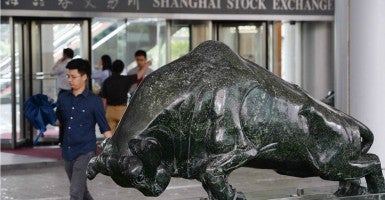From the summer of 2009 through 2012, I was an American economist living in Beijing.
Although an avid stock investor, I have never once owned a Chinese listed company.
Let me tell you why.
Traditionally, Chinese households have had (basically) two places to put their savings: the banking system and residential real estate.
With housing prices falling in most large cities, more Chinese households have turned to stocks to build their savings in recent years.
The Chinese authorities have openly encouraged this allocation and according to The Wall Street Journal, China now has 90 million retail stock investors—outnumbering the 88 million members of its Communist Party.
Since most stocks have been purchased on 50 percent margin (50 percent of the stock price has been borrowed) a fall in stock prices requires investors to put up additional money, perpetuating the downward cycle.
There is nothing more important than transparency and trust between a creditor and debtor in the ownership of securities.
Despite possessing the second largest stock market in the world (measured in stock market capitalization) after the United States, China lacks most of the attributes of imbuing and sustaining investors’ confidence.
An incredible 80 percent of the companies listed on the Shanghai Stock Exchange Composite are state-owned.
As a result, politics play an enormous role in market cycles and financial returns.
Investors are essentially betting on political information, rumor and hearsay.
In addition to this, the Chinese banking system is highly leveraged and has been continuously bailed out over the years (The higher the leverage the greater the risk).
China is attempting to restructure its economy towards a more “market-based” system through developing its bond and equity markets in order to rely less on its banking system.
At first, this transition appeared to be working.
It has now, however, lost more than 30 percent of its value since the equity market peaked in mid-June (it more than doubled in value in the previous 18 months).
In response to the precipitous market meltdown on Wednesday morning of this week, more than half of China’s 2,800 listed companies suspended trading.
How does the draconian decline in Chinese equities in such a short period of time potentially impact the Chinese economy and political outlook?
First, a fall in stock prices (Chinese shares were already selling relatively cheap before the correction) directly increases the cost of capital, making it harder for Chinese corporations to raise fresh capital and move up the technological chain.
For most emerging markets trapped in the infamous middle-income-trap, this could have ominous consequences.
The political outlook is much more difficult to discern.
While the Chinese government has quadrupled its aggregate debt since 2008—from $7 trillion to $28 trillion, primarily from a massive government stimulus—a financial crisis could run one of two directions.
On the one hand, it could force the central authorities to accelerate free-market reforms; particularly if they view they have no choice.
Alternatively Chinese authorities could clamp down even more and double down on promoting nationalism, which does not bode well for the precarious situation in the Pacific. In 2007 and 2008, the Shanghai Composite index fell from 6,000 to below 2,000, yet the Chinese economy ploughed ahead with few hiccups.
This time, however, it could be very different.
I will certainly not be buying any Chinese stocks anytime soon.






























